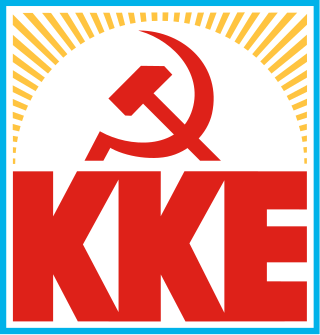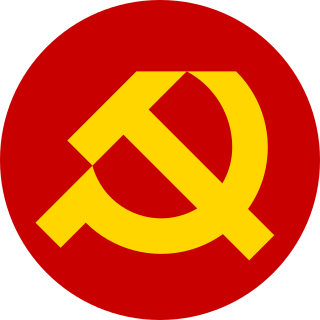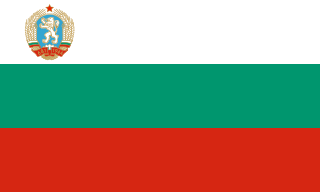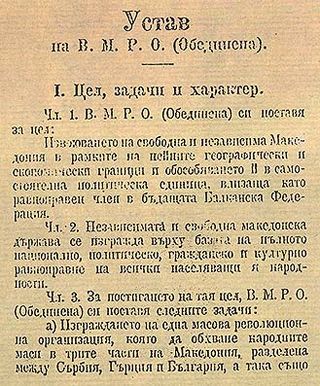
The Chinese Communist Party (CCP), officially the Communist Party of China (CPC), is the founding and sole ruling party of the People's Republic of China (PRC). Under the leadership of Mao Zedong, the CCP emerged victorious in the Chinese Civil War against the Kuomintang. In 1949, Mao proclaimed the establishment of the People's Republic of China. Since then, the CCP has governed China and has sole control over the People's Liberation Army (PLA). Each successive leader of the CCP has added their own theories to the party's constitution, which outlines the ideology of the party, collectively referred to as socialism with Chinese characteristics. As of 2022, the CCP has more than 96 million members, making it the second largest political party by membership in the world after India's Bharatiya Janata Party.
A communist party is a political party that seeks to realize the socio-economic goals of communism. The term "communist party" was popularized by the title of The Manifesto of the Communist Party (1848) by Karl Marx and Friedrich Engels. As a vanguard party, the communist party guides the political education and development of the working class (proletariat). As a ruling party, the communist party exercises power through the dictatorship of the proletariat. Vladimir Lenin developed the idea of the communist party as the revolutionary vanguard, when the socialist movement in Imperial Russia was divided into ideologically opposed factions, the Bolshevik faction and the Menshevik faction. To be politically effective, Lenin proposed a small vanguard party managed with democratic centralism which allowed the centralized command of a disciplined cadre of professional revolutionaries. Once a policy was agreed upon, realizing political goals required every Bolshevik's total commitment to the agreed-upon policy.

The Communist International (Comintern), also known as the Third International, was a Soviet-controlled international organization founded in 1919 that advocated world communism. The Comintern resolved at its Second Congress to "struggle by all available means, including armed force, for the overthrow of the international bourgeoisie and the creation of an international Soviet republic as a transition stage to the complete abolition of the state". The Comintern was preceded by the 1916 dissolution of the Second International.

The Communist Party of Greece is a Marxist–Leninist political party in Greece. It was founded in 1918 as the Socialist Labour Party of Greece and adopted its current name in November 1924. It is the oldest political party in modern Greek politics. The party was banned in 1936, but played a significant role in the Greek resistance and the Greek Civil War, and its membership peaked in the mid-1940s. Legalization of the KKE was restored following the fall of the Greek military junta of 1967–1974.

Communist Party USA, officially the Communist Party of the United States of America (CPUSA), also known as the American Communist Party, is a Marxist–Leninist communist party in the United States which was established in 1919 after a split in the Socialist Party of America following the Russian Revolution.

The Internal Macedonian Revolutionary Organization, was a secret revolutionary society founded in the Ottoman territories in Europe, that operated in the late 19th and early 20th centuries.

Kimon Georgiev Stoyanov was a Bulgarian general who was the Prime Minister of the Kingdom of Bulgaria from 1934 to 1935 and again from 1944 to 1946.

The Bulgarian Communist Party was the founding and ruling party of the People's Republic of Bulgaria from 1946 until 1989, when the country ceased to be a socialist state. The party had dominated the Fatherland Front, a coalition that took power in 1944, late in World War II, after it led a coup against Bulgaria's tsarist regime in conjunction with the Red Army's crossing the border. It controlled its armed forces, the Bulgarian People's Army.

The People's Republic of Bulgaria, from 1990 onwards known as Republic of Bulgaria, was the official name of Bulgaria when it was a socialist republic from 1946 to 1990, ruled by the Bulgarian Communist Party (BCP) together with its coalition partner, the Bulgarian Agrarian People's Union. Bulgaria was closely allied and one of the most loyal satellite states of the Soviet Union during the Cold War, sometimes being called the 16th Soviet Republic rather than an independent country. Bulgaria was also part of Comecon as well as a member of the Warsaw Pact. The Bulgarian resistance movement during World War II deposed the Kingdom of Bulgaria administration in the Bulgarian coup d'état of 1944 which ended the country's alliance with the Axis powers and led to the People's Republic in 1946.

The Internal Macedonian Revolutionary Organization (United) (1925–1936) (Bulgarian: Вътрешна македонска революционна организация - обединена, romanized: Vatreshna makedonska revolyucionna organizatsiya - Obedinena; Macedonian: Внатрешна македонска револуционерна организација - обединета, romanized: Vnatreshna makedonska revolucionerna organizacija - obedineta), commonly known in English as IMRO (United), was the name of a revolutionary political organization active across the entire geographical region of Macedonia.

The All-China Women's Federation is a women's rights people's organization established in China on 24 March 1949. It was originally called the All-China Democratic Women's Foundation, and was renamed the All-China Women's Federation in 1957. It has acted as the official leader of the women’s movement in China since its founding. It is responsible for promoting government policies on women, and protecting women’s rights within the government, while liberating them from traditional norms within society and involving them in social revolution with the aim to promote their overall status and welfare in Chinese society. As a united political community, women in the ACWF achieved political momentum, power among the male elite, and required representation.

The Bulgarian Agrarian National Union (BANU) also translated to English as Bulgarian Agrarian People's Union is a political party devoted to representing the causes of the Bulgarian peasantry. It was an agrarian movement and was most powerful between 1900 and 1923. Unlike the socialist movements of the early 20th century, it was devoted to questions concerning agriculture and farmers, rather than industry and factory workers. The BZNS, one of the first and most powerful of the agrarian parties in Eastern Europe, dominated Bulgarian politics during the beginning of the 20th century. It is also the only agrarian party in Europe that ever came to power with a majority government, rather than merely as part of a coalition. It is a founding member of the former International Agrarian Bureau.
The National Liberation Front, also known as the People's Liberation Front, was a communist political and military organization created by the Slavic Macedonian minority in Greece. The organization operated from 1945–1949, most prominently in the Greek Civil War. As far as its ruling cadres were concerned its participation in the Greek Civil War was nationalist rather than communist, with the goal of secession from Greece.

The Zhivkov Constitution was the third Constitution of Bulgaria, and the second of the Communist era. It was in effect from May 18, 1971 to July 12, 1991.

Andrey Kovatchev, is a Bulgarian politician, Member of the European Parliament, a federalist and Head of the Bulgarian Delegation in the EPP Group in the European Parliament. Dr. Andrey Kovatchev is a chairman of the Union of European Federalists in Bulgaria. Since 2011 he has also been its vice-president. In January 2012 he was elected vice-chair of AFET - Committee on Foreign Affairs of the European Parliament.
The "May Manifesto" of May 6, 1924 was a paper in which the objectives of the unified Macedonian liberation movement were presented: independence and unification of partitioned region of Macedonia, fighting all the neighbouring Balkan monarchies, supporting the Balkan Communist Federation and cooperation with the Soviet Union.

The Information Bureau of the Communist and Workers' Parties, commonly known as Cominform, was a co-ordination body of Marxist-Leninist communist parties in Europe during the early Cold War that was formed in part as a replacement of the Communist International. The Cominform was dissolved during de-Stalinization in 1956.

The All-Union Leninist Young Communist League, usually known as Komsomol, a syllabic abbreviation of the Russian Коммунистический Союз Молодёжи, was a political youth organization in the Soviet Union. It is sometimes described as the youth division of the Communist Party of the Soviet Union (CPSU), although it was officially independent and referred to as "the helper and the reserve of the CPSU".

Women in Bulgaria refers to women who live in and are from Bulgaria. Women's position in Bulgarian society has been influenced by a variety of cultures and ideologies, including the Byzantine and Ottoman cultures, Eastern Orthodox Christianity, communist ideology, and contemporary globalized Western values.















